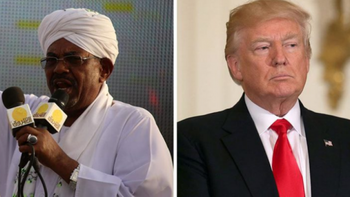The United States of America on Friday ended its 20-year-old economic sanctions against Sudan, citing improvements in human rights record and counter-terrorism.
But the Trump administration did not drop Sudan from its blacklist of state terror sponsors nor end its support for indictment by ICC targeting President Omar al-Bashir.
Enough Project, a Washington D.C. based advocacy group, said the Trump administration should create a completely new policy framework which aims to address the core issues that led the regime to be sanctioned in the first place.
John Prendergast, Founding Director at the Enough Project, said focus should be on promoting fundamental human rights and religious freedoms, countering grand corruption, and achieving peace in Sudan's various war-torn regions.
But these serious policy objectives, according to Prendergast, need serious leverage, and thus this new policy framework should be tied to a new set of smart, modernized network sanctions, including asset freezes targeting a network of individuals and entities, rather than a single person, that spare the Sudanese public and target those in power responsible for mass atrocities, the demolition of churches, obstruction of humanitarian aid, jailing and torturing journalists, and undermining of peace efforts.
Dr. Suliman Baldo, Senior Advisor at the Enough Project, said, “With the comprehensive U.S. sanctions permanently lifted, the regime of President Omar al-Bashir will have no room to continue to shift blame to the U.S. sanctions for the devastating effects on the Sudanese people of its own grand corruption and gross mismanagement of the economy. The regime will need to own the outcomes of its own greed and brutality.”
Omer Ismail, Senior Advisor at the Enough Project, said: “Now that the U.S. has lifted the sanctions on Sudan, it is incumbent upon the Trump Administration to see to it that Sudan does not return to its policies that prompted the sanctions in the first place. Sudan should be pressured to continue to improve its human rights record, respect religious freedom, and chart a way for a peace process that is credible and just.”




